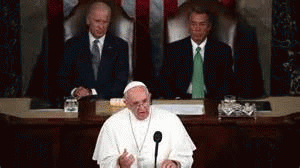Pope Francis addressed not just the dignitaries in the Senate chambers, but all of us -- parents struggling to support families, social activists, the elderly and the young.
The pope emphasized communitarian values: dialog, the common good, solidarity, cooperation, sharing, and the Golden Rule.
He held up for emulation four counter-cultural heroes he understood as embodying the most admirable of "American" values. They weren't Rockefeller, Reagan, Jobs, or even FDR. Instead they were:
- Abraham Lincoln: the champion of liberty for the oppressed
- Martin Luther King: the advocate of pluralism and non-exclusion
- Dorothy Day: the apostle of social justice and the rights of the poor
- Thomas Merton: the Cistercian monk who embodied openness to God and the capacity for inter-faith dialog.
Of course, Lincoln and King were victims of assassination for championing the rights of African Americans.
Day and Merton vigorously resisted what Dorothy Day called "this filthy, rotten system." (As is well-known, she was also an unwed mother whose first pregnancy ended in abortion.)
Following the examples of The Four, the pope called for the end of:
- Fundamentalisms of every kind -- including economic fundamentalisms
- Political polarizations that prevent opposing parties from dialog and cooperation
- Exclusion of immigrants by a nation of immigrant descendants
- Capital punishment and its replacement by programs of rehabilitation
- The global arms trade and arms sales in general along with the wars and violence they stimulate
- Violent conflict and its replacement by difficult but essentially diplomatic process of dialog
- The human roots of climate chaos and the related problems of poverty
- Unlimited and directionless development of technology
Throughout this gentle but radical speech, the audience seemed to be waiting for the other shoe to drop -- i.e. for the pope to mollify his conservative critics by addressing their favorite "religious issues" contraception, abortion, gay marriage. But the shoe never hit the floor.
At two points the pope about to untie his footwear. In mid-speech, he stated that we must protect and defend human life at every stage of its development. This lured his audience into a standing ovation.
However, the illustration of his point was not abortion, but capital punishment. Punishment for crime, Francis said, must never exclude hope and rehabilitation. We must end the death penalty, he asserted, since every life is sacred.
Then towards the end of his address, Francis spoke of his anticipated presence at this weekend's Philadelphia Conference on the family. Families, he said, are threatened as never before, both from within and without.
But then, instead of addressing gay marriage, the pope spoke of the "most vulnerable" in this context -- not the unborn, but "the young" threatened by violence, abuse and despair. Many of them hesitate to even start families, he lamented -- some because of their own lack of possibilities. Others demur because they have too many possibilities. "Their problems are our problems," the pope said. We must address them and solve their underlying causes.
It was a masterful speech. It continually lured conservatives into standing ovations for issues they constantly oppose: the end of the capital punishment, protection of the environment, openness to immigrants, the end of arms sales of all kinds. The address summoned legislators to their real responsibility -- pursuing the common good, the chief aim, the pope said, of all politics.
The pope's basic message was be daring and courageous -- like the counter-cultural activists, Lincoln, King, Day, Merton, and (I would add) Pope Francis!"






